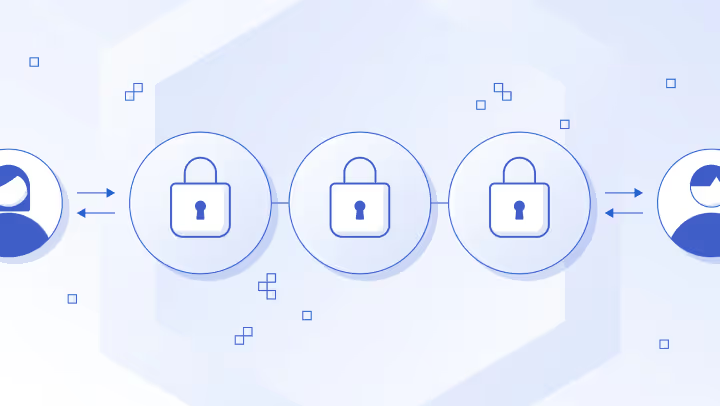What Is Cross-Chain Compatibility?
Cross-chain compatibility means the ability of different blockchains to recognize and interpret each other’s data and assets, regardless of their underlying architecture.
The blockchain ecosystem has become multi-chain, with hundreds of public blockchains, layer-2 networks, appchains, and other networks, and potentially thousands more public and private blockchains with trillions in value flowing onchain in the coming years.
Given this rapid expansion of disparate onchain ecosystems, the need for seamless cross-chain communication and interaction between blockchains has never been more important. As a result, cross-chain interoperability has become a cornerstone of the blockchain ecosystem, with Chainlink CCIP being established as the universal cross-chain standard across both public and private blockchains.
Cross-chain compatibility is the ability of different blockchains to understand each other’s data and assets. In this blog, we explain cross-chain compatibility and how it compares to cross-chain interoperability.
What Is Cross-Chain Compatibility?
Cross-chain compatibility means the ability of different blockchains to recognize and interpret each other’s data and assets, regardless of their underlying architecture. This compatibility provides the foundation for a blockchain ecosystem where data and value can flow freely across different networks through cross-chain interoperability.
Cross-chain compatibility is achieved through the use of cross-chain interoperability infrastructure, such as:
- Protocol-level: A cross-chain interoperability protocol standardizes cross-chain interactions. Chainlink’s Cross-Chain Interoperability Protocol (CCIP) provides a universal framework for connecting blockchains, unlocking a unified Internet of Contracts where data and value can flow seamlessly across a multitude of onchain environments.
- Application-level: Cross-chain applications facilitate the transfer of assets and data between different blockchains. Transporter and XSwap are crypto bridging apps built on Chainlink CCIP that enable users to securely transfer their tokens across blockchains.
Cross-Chain Compatibility vs. Interoperability
While often used interchangeably, cross-chain compatibility and interoperability have distinct meanings:
- Cross-chain compatibility—The ability of different blockchains to recognize and interpret each other’s data and assets.
- Cross-chain interoperability—The ability of different blockchains to interact with each other through a blockchain interoperability protocol. Interoperability elevates compatibility to the next level, enabling complex interactions like cross-chain smart contracts.
Chainlink’s Role in Cross-Chain Compatibility
Just as TCP/IP is a universal standard that underpins the Internet, Chainlink CCIP serves as a universal standard that underpins the Internet of Contracts. By establishing cross-chain interoperability between blockchains, CCIP also enhances cross-chain compatibility missing from the blockchain ecosystem as native capability.
.gif)
CCIP establishes a universal connection between public and private blockchains so that arbitrary data, tokens, and/or messages alongside tokens can be sent between chains. CCIP supports Programmable Token Transfers that enable transferring tokens, messages, or both tokens and messages simultaneously within a single cross-chain transaction, enabling complex, multi-step cross-chain transactions.
CCIP prioritizes end-to-end system security, providing the blockchain ecosystem with native level-5 cross-chain security to unlock a secure multi-chain economy. CCIP utilizes multiple decentralized networks to secure a single cross-chain transaction and incorporates additional security measures, such as the first-of-its-kind Risk Management Network—a separate, independent network that continuously monitors and validates the behavior of the primary CCIP network, adding an extra layer of security by independently verifying cross-chain operations.
These advanced features and more are why major financial institutions and market infrastructure providers are already collaborating with Chainlink on using CCIP to unlock the potential of blockchain technology and tokenized assets, including Swift, DTCC, ANZ Bank, and Fidelity International and Sygnum.
Cross-Chain Use Cases Enabled by CCIP
By standardizing cross-chain interactions, CCIP enables a wide range of use cases that increase cross-chain compatibility, including:
- Cross-chain tokenized assets—Tokenized assets that can be utilized across any blockchain, with key data points moving with them as they move across chains.
- Cross-chain DvP—Cross-chain Delivery vs. Payment (DvP) transactions that ensure that the transfer of assets and the corresponding payment occur simultaneously.
- Cross-chain lending—Lending applications that allow users to deposit collateral on one blockchain and borrow assets on another.
- Cross-chain liquid staking/restaking—Liquid staking tokens (LSTs) and liquid restaking tokens (LRTs) that can be used across multiple networks in the DeFi ecosystem.
- Cross-chain NFTs—NFTs that can be minted on a source blockchain and received on a destination blockchain.
- Cross-chain gaming—Blockchain-agnostic gaming experiences that enable players to transfer in-game assets between chains.
- Cross-chain data storage—Data storage solutions that let users store data on a blockchain and execute computations on it from a different chain.
Scaling a Compatible Onchain Finance Ecosystem With CCIP
As thousands of banks continue to launch their own blockchains and DLT networks to tap into the tokenized asset megatrend, the need for a global blockchain interoperability standard that enables secure cross-chain interactions will continue to grow. Additionally, as more DeFi activity moves to rollups and other layer-2 networks, the ability to interact cross-chain will become increasingly essential.
CCIP provides the universal interoperability standard that allows seamless cross-chain compatibility and interoperability between public and private chains, which is necessary for realizing onchain finance at scale.











